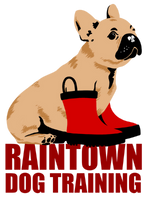Preparing your Dog for Spooky Season & Puppy Socials
Tip 1:
Preparing for Spooky Season
Halloween is approaching - cue the fireworks, door knocking, and happy kiddos!
If your pup is sensitive to sounds or has never experienced fireworks before, here are a few tips to help you prepare:
Play fireworks, door knocking and children laughing sounds from YouTube or Spotify at a low volume and pair with high value treats. Slowly increase the volume only when your pup is comfortable at the current level.
Take your dog for a sniff walk before the trick-or-treaters start knocking on doors. Keep them on leash and ensure they are wearing a well-fitted harness with ID tags.
Give your dog a chew, snuffle mat, lick mat or frozen Toppl to keep them occupied and to calm them down.
Leave the TV on or play music to drown out the noise of fireworks.
If your dog is scared, comfort them. Emotions such as fear cannot be reinforced. Let your dog know they are safe.
Tip 2:
Puppy Socialization
We will never stop emphasizing the importance of properly socializing your puppy! A puppy's socialization period ends at approximately 18 weeks of age. It is crucial during this period to safely and slowly introduce them to as many positive experiences as possible at their pace. This includes (but is not limited to), people, dogs, sounds, surfaces and body handling. Do not wait until your pup is fully vaccinated to begin socialization. Read the AVSAB's position statement on socialization here.
Play is a big part of a puppy’s socialization period as well. Puppies learn healthy play behaviours and bite inhibition through interacting with other pups. Puppy socials in sanitized spaces, monitored by qualified trainers are an excellent way to ensure puppies are having fun without becoming overwhelmed. At the same time, parents can learn how to read dog body language and perform consent checks when needed.
Check out our puppy socials here!
Thought of the Week
"The key to separation anxiety is gradually increasing increments and repetition. It is a rare occurrence when we are actually trying to get our dogs bored in life...bored is a bad thing for dogs, right? Indeed, in separation anxiety training, boring is a good thing. We want the dog to feel that the owner repeatedly leaving home and coming back is the most boring thing ever, so he will just hang out and possibly nap."
-Malena DeMartini



